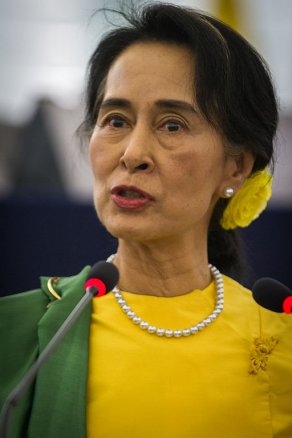
Photo: Claude Truong-Ngoc
Will Aung San Suu Kyi dare to engage in a direct confrontation with religious nationalism and insist that the new parliament reconsider Myanmar’s laws on race and religion? Doing so could cost her dearly.
Sexual violence
Myanmar (formerly known as Burma) has been in a continuous state of civil war since its foundation as a state in 1948. Different ethnic minorities have opposed the central government, because they view the state as illegitimate. The resulting wars have led to enormous suffering for women, men and children. War affects women and men differently, however. A particularly serious consequence has been the army’s use of sexualized violence against ethnic minority women. Violence against women is a widespread problem, but Burma offers little legal protection to victims either of domestic violence or of various forms of sexualized violence. In addition, women have been omitted systematically from peace negotiations between rebel groups and the state. Consequently, 52% of the country’s population is not included in the process of building political foundations for future peace.
A tradition of exclusion
Women have traditionally enjoyed a strong position in Burmese society, with rights to initiate divorce, inherit assets, and own property. Nonetheless, during more than 50 years of military dictatorship, women have been excluded from political decision-making processes. This became obvious during the election three weeks ago, when the parties nominated very few women on their lists of candidates. Suu Kyi’s quasi-royal status is thus not representative of the status of women in the public and political domain. Will “The Lady” succeed in building a party organization where sufficient numbers of women are given sufficient training to fill political positions in the future? That remains to be seen.
Religious nationalism
Myanmar’s political reforms have led to a strong growth of Buddhist nationalism. This nationalism seeks to protect “race and religion” during a period of rapid social and political change. The opening up of the country has led to widespread concerns about increased immigration, foreign investment and increased pressure from religious minorities. These elements are often linked together and seen as a manifestation of “islamization”, which is thought to lead to the downfall of Buddhism.
Restrictions on religious freedom and women’s rights
There is no statistical data to support claims regarding the “Islamization” of Myanmar. Nonetheless, Myanmar’s parliament passed four new laws in 2015 that are designed to protect “race and religion”. The laws were passed following strong pressure from radical Buddhist groups. The four laws govern the right to convert from one religion to another; legal restrictions on the rights of Buddhist women to marry non-Buddhist men; the implementation of compulsory monogamy and the criminalization of adultery; and population control measures in selected states. The laws are extremely controversial, but they are also supported by many Buddhist women, because they put the status of women higher up the agenda. There is a widespread belief that Muslim men are rapists, and many Buddhist women believe that the laws are important in order to protect them from attacks by Muslim men, even though none of the laws deals with sexualized violence.
Opposition from Myanmar´s own women
The strongest opposition to the laws comes from Myanmar’s many human rights and women’s groups. They question why it is the task of women to protect the nation, and why this task is being linked to women’s bodies and reproduction. Specifically, these groups have criticized the law that regulates the right of Buddhist women to marry freely, as well as the population control act that seeks to limit the number of births in areas with “high immigration” and “large families”. Such areas are understood to mean the Rakhine State, which is home to the Rohingya Muslims. Many fear that the law will lead to attacks on Muslim women. In addition, campaigners for freedom of religion fear that the law on religious conversion will impose stringent government controls on conversions, so that it will become difficult to convert from Buddhism to, for example, Islam or Christianity.
The price for confronting religious nationalism
The laws were proposed by President Thein Sein and the former government, while the generals adopted a wait-and-see attitude in parliament. Suu Kyi and her party voted mainly against the laws. During the election in November, the radical Buddhist monks gained less support for their protectionist agenda than many had feared. This does not mean, however, that people voted actively against the four laws. The laws still have support in many circles. Will Suu Kyi dare to engage in a direct confrontation with religious nationalism and demand reconsideration of these laws by a new parliament? This could cost her dearly. But such a confrontation will be crucial for women’s rights and the right of freedom of religion in a new and democratic Myanmar.
- This text was published as an op ed “Tør Aung San Suu Kyi ta et oppgjør med religiøs nasjonalisme?” in Norwegian in Vårt Land 4 December 2015. Online version at verdidebatt.no
- Translation from Norwegian: Fidotext